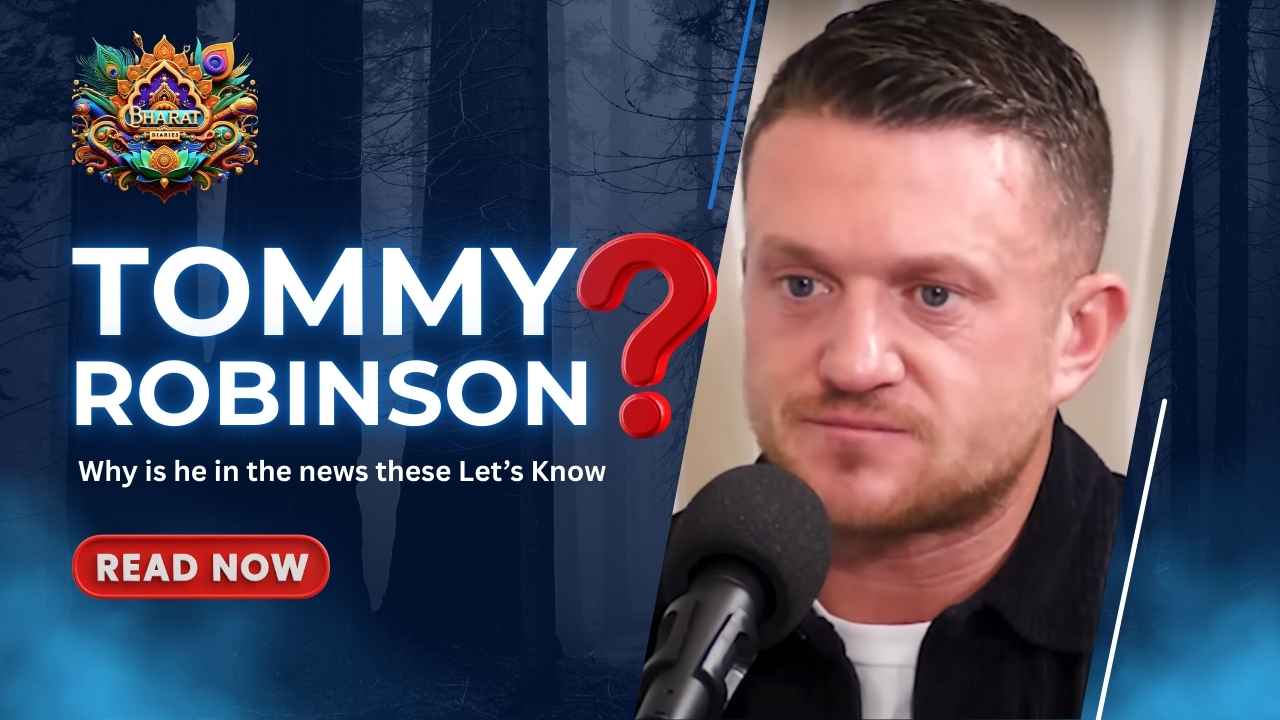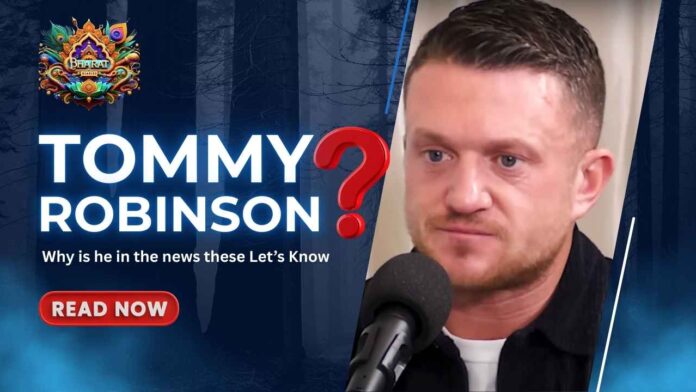
Discover who Tommy Robinson is, why he’s dominating headlines with massive anti-immigration rallies, and his global impact on far-right movements. Explore his biography, legal battles, and divisive legacy for a global audience.
Table of Contents
In a world where political activism often blurs the lines between free speech and extremism, few figures spark as much debate as Tommy Robinson. Born Stephen Yaxley-Lennon, Tommy Robinson has become synonymous with far-right activism in the UK, drawing massive crowds to protests and igniting global conversations on immigration, Islam, and national identity. As of September 2025, Tommy Robinson is back in the spotlight, organizing one of the largest rallies in recent British history, with over 100,000 participants marching through London under the banner “Unite the Kingdom.” But who is Tommy Robinson really? Why is Tommy Robinson in the news again, and what is the global impact of his actions? This blog dives deep into his life, from his humble beginnings to his role as a polarizing “citizen journalist,” exploring the controversies, supporters, and critics that define him. Whether you’re curious about his anti-Islam rhetoric or his influence on international far-right networks, we’ll break it down in simple terms, highlighting real-world examples of how his activism affects everyday people around the globe. By the end, you’ll have a clearer picture of why Tommy Robinson remains a lightning rod in today’s political landscape.
Early Life and Background of Tommy Robinson
Tommy Robinson’s story starts in the working-class town of Luton, England, where he was born in 1982 to an Irish mother and an English father. Growing up in the 1980s and 1990s, he experienced the multicultural shifts in British society firsthand, which later fueled his views on immigration and Islam. Like many young men in his community, Robinson was involved in football culture, but this soon veered into hooliganism. He joined groups associated with Luton Town FC, engaging in street fights and clashes that foreshadowed his future activism.
Imagine a teenager navigating the rough edges of urban life, where economic struggles mix with cultural tensions—this is the backdrop that shaped Robinson. He left school early and worked as an aircraft engineer, but his real turning point came in the late 2000s. Frustrated by what he saw as radical Islam’s growing influence in Luton, including protests by Islamist groups against British troops, Robinson adopted his pseudonym (inspired by a football hooligan leader) to protect his identity while speaking out. This early phase wasn’t just about personal grievances; it reflected broader anxieties in working-class communities feeling overlooked by mainstream politics. Long-tail keywords like “Tommy Robinson early life” often lead searchers to stories of his transformation from an ordinary bloke to a vocal critic, highlighting how personal experiences can ignite public movements.
His background isn’t without controversy. Critics point to his criminal record, including convictions for assault and fraud, as evidence of a troubled past rather than genuine patriotism. Yet, supporters argue it shows his “realness”—a man from the streets fighting for what he believes in. This duality sets the stage for understanding how Robinson evolved from local agitator to international figure.
The Founding of the English Defence League and Rise to Prominence
In 2009, Tommy Robinson co-founded the English Defence League (EDL), a street protest group that quickly gained notoriety for its anti-Islam stance. The EDL positioned itself as a defender of English culture against what Robinson called “Islamist extremism,” organizing marches that often descended into violence. Picture a rally where thousands chant against Sharia law, waving St. George’s flags— that’s the EDL in action, drawing from football firms and disaffected youth.
Robinson’s charisma was key to the group’s rapid growth. He used social media to amplify his message, claiming the mainstream media ignored issues like grooming gangs in towns like Rotherham. While journalists like Andrew Norfolk from The Times actually broke those stories, Robinson’s videos and speeches brought them to a wider audience, earning him praise from some as a whistleblower. Searches for “Tommy Robinson EDL founder” reveal how the group expanded across the UK, with branches in cities facing similar tensions.
However, the EDL’s tactics drew sharp criticism. Accusations of racism and Islamophobia followed, with marches often clashing with counter-protesters and police. Robinson left the EDL in 2013, citing infiltration by extremists, but his departure didn’t end his activism. Instead, it marked a shift to “citizen journalism,” where he produced documentaries and books like “Enemy of the State,” detailing his views on Islam and immigration. This period solidified his rise, turning him into a symbol for those feeling silenced by political correctness. As we move to his legal battles, it’s clear how these early actions laid the groundwork for ongoing controversies.
Legal Troubles and Controversies Surrounding Tommy Robinson
Tommy Robinson’s career is riddled with legal issues that have both hindered and boosted his profile. From mortgage fraud in 2014, for which he served time, to assaults on police and fellow inmates, his record paints a picture of a man often at odds with the law. One of the most infamous incidents was his 2018 contempt of court conviction for live-streaming outside a grooming gang trial, nearly causing a mistrial. Supporters rallied with “Free Tommy” campaigns, seeing it as a free speech attack, while critics argued it endangered justice.
Consider the 2021 libel case where Robinson was ordered to pay £100,000 to a Syrian refugee schoolboy he falsely accused of violence. This wasn’t an isolated event; in 2025, similar accusations surfaced when he shared a video smearing an innocent Black man as suspicious, leading to harassment and forcing the family into hiding. Long-tail queries like “Tommy Robinson legal controversies” often uncover these stories, showing how his rhetoric can harm individuals.
Allegations of personal misconduct add layers. Reports of cocaine use, gambling away donations, and associations with far-right figures have tarnished his image. Yet, Robinson frames these as smears by the “establishment.” In January 2025, he began an 18-month sentence for contempt, but by September, he’s out and organizing rallies, highlighting his resilience. These troubles feed into why Tommy Robinson is in the news today, as his latest actions echo past patterns of defiance.
Why Tommy Robinson Is in the News in 2025
Fast-forward to September 2025, and Tommy Robinson is dominating headlines with the “Unite the Kingdom” rally in London on September 13. Drawing an estimated 110,000 to 150,000 people, the event protested against immigration policies, with chants like “Stop the Boats” echoing through the streets. Clashes erupted, injuring police, as a small group turned violent, underscoring the rally’s tense atmosphere.
Why now? Robinson’s release from prison earlier in the year allowed him to mobilize supporters amid rising UK tensions over migration and free speech. High-profile endorsements amplified the event: American conservative Charlie Kirk spoke, and Elon Musk shared a “Fight or Die” message, boosting visibility. On X (formerly Twitter), posts hailed it as a “day of rage” for patriots, while critics decried it as an anti-Islam march funded by foreign interests.
Real-world examples abound: Attendees urinated on streets in “patriotic” displays, and counter-protesters clashed, highlighting divisions. A Sikh girl’s rape, blamed on rally-inspired hate, shows the darker side. Searches for “Tommy Robinson latest news 2025” spike with these events, linking back to his ongoing narrative of fighting “two-tier policing.” This buzz transitions naturally to his broader global impact, where his influence extends far beyond the UK.
The Global Impact of Tommy Robinson’s Activism
Tommy Robinson’s reach isn’t confined to Britain; his anti-immigration message resonates worldwide, influencing far-right movements in Europe, the US, and beyond. Funded partly by American donors, he’s transformed into a “poster boy” for populism, producing slick videos that garner millions of views. Think of how his rhetoric inspired the Finsbury Park mosque attack in 2017, where the perpetrator cited Robinson’s posts. Globally, this has ripple effects, fueling similar anti-Muslim sentiments in countries like Germany and France.
In the US, figures like Elon Musk and Charlie Kirk amplify his voice, framing him as a free speech martyr. His ties to Israeli funders add complexity, with some X posts claiming he’s a “Zionist pawn” waving Israeli flags at rallies. This global funding has allowed him to tour internationally, speaking at events and building alliances with groups like PEGIDA in Germany.
The impact? Heightened debates on immigration worldwide. In Australia or Canada, similar activists echo his calls against “Islamization,” leading to policy shifts or protests. However, it also incites division—riots in Hartlepool chanted his name, showing how his words can spark violence. Long-tail keywords like “Tommy Robinson global impact” reveal his role in connecting far-right networks, making him a figure whose actions affect global security and social cohesion. As we explore supporters and critics, this influence becomes even clearer.
Supporters, Critics, and the Polarizing Legacy of Tommy Robinson
Tommy Robinson’s legacy is a tale of two sides. Supporters view him as a national treasure, exposing grooming gangs and defending British values against elite betrayal. On X, posts praise his rallies as unifying, with millions tuning in to his content. They argue mainstream media demonizes him to silence dissent, pointing to his books and films as evidence of journalistic integrity.
Critics, however, label him a hate preacher and racist, whose Islamophobia incites violence. Bands like James distanced themselves after he used their song at a rally, and figures like Nigel Farage avoid him as a liability. Examples include the Hartlepool riots and defamation cases, where his misinformation ruined lives. LSI terms like “Tommy Robinson Islamophobia” highlight accusations of selective outrage, ignoring non-Muslim abusers.
This polarization extends to his media empire, with X boosting his reach under Musk’s ownership. Ultimately, his legacy challenges societies to balance free speech with hate prevention.
Other Aspects: Media Presence, Books, and Future Outlook
Beyond protests, Tommy Robinson has built a media brand. His X account, with millions of followers, shares videos claiming media bias, like disputing rally attendance figures. Books such as “Manifesto” and “Silenced” detail his life, selling well among fans.
Looking ahead, with ongoing legal fights and potential bans, his future remains uncertain. Yet, his ability to rally crowds suggests he’ll continue influencing debates on identity and immigration globally.
Conclusion
Tommy Robinson, the far-right activist whose real name is Stephen Yaxley-Lennon, has evolved from a Luton local to a global symbol of anti-immigration fervor. From founding the EDL to leading massive 2025 rallies amid clashes and endorsements from figures like Elon Musk, his story underscores deep societal divides. While supporters hail him as a free speech hero exposing uncomfortable truths, critics decry his role in spreading hate and misinformation that harms innocents. The global impact of Tommy Robinson extends to inspiring far-right networks worldwide, challenging us to confront issues like migration and extremism head-on. In a polarized world, understanding figures like him is crucial for fostering informed dialogue. If this sparked your interest, share your thoughts below or explore more on far-right movements—what do you think his next move will be?
